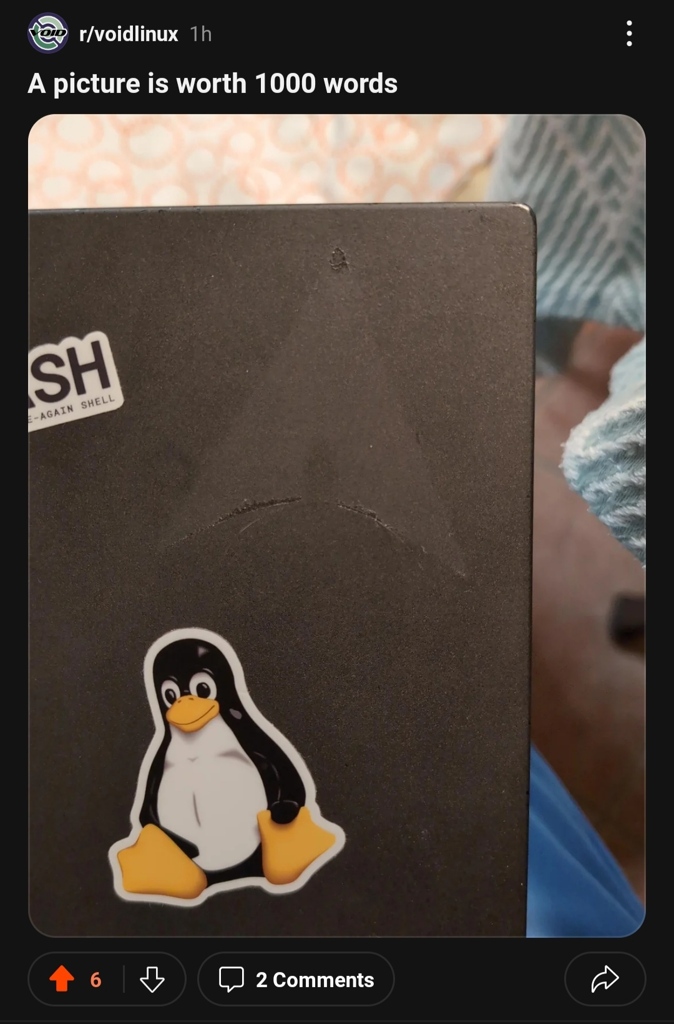this post was submitted on 26 Mar 2024
877 points (95.9% liked)
linuxmemes
21009 readers
526 users here now
Hint: :q!
Sister communities:
- LemmyMemes: Memes
- LemmyShitpost: Anything and everything goes.
- RISA: Star Trek memes and shitposts
Community rules (click to expand)
1. Follow the site-wide rules
- Instance-wide TOS: https://legal.lemmy.world/tos/
- Lemmy code of conduct: https://join-lemmy.org/docs/code_of_conduct.html
2. Be civil
- Understand the difference between a joke and an insult.
- Do not harrass or attack members of the community for any reason.
- Leave remarks of "peasantry" to the PCMR community. If you dislike an OS/service/application, attack the thing you dislike, not the individuals who use it. Some people may not have a choice.
- Bigotry will not be tolerated.
- These rules are somewhat loosened when the subject is a public figure. Still, do not attack their person or incite harrassment.
3. Post Linux-related content
- Including Unix and BSD.
- Non-Linux content is acceptable as long as it makes a reference to Linux. For example, the poorly made mockery of
sudoin Windows. - No porn. Even if you watch it on a Linux machine.
4. No recent reposts
- Everybody uses Arch btw, can't quit Vim, and wants to interject for a moment. You can stop now.
Please report posts and comments that break these rules!
founded 1 year ago
MODERATORS
you are viewing a single comment's thread
view the rest of the comments
view the rest of the comments

I'll put it on a spare SSD on my PC tomorrow. By any chance, is it possible to install Void on an Apple Silicon MacBook? I'm really annoyed by Fedora Asahi and I'm looking for a better distro to put on it.
IDK, depends on the CPU architecture... I'm not that famlilar with Macs, but if it's x64 capable, yeah, no problem.
I think there was a list of supported architectures on the website 🤔...
Can't find it now. Anyway, x86, x86_64, ARMv6/v7/v8 are all supported out of the box. PPC is also supported, but you have to build everything yourself from scratch (there was one maintainer that maintained a PPC build, but he gave up on it a year or so ago, he went on to form Chimera Linux), which can be done by crossbuilding on any of the supported architectures using xbps-src... but that's a lot of work to be honest, if it's a PPC architecture, you're better off using Chimera Linux.
I do recommend trying the glibc version first, since you'd have to run everything that depends on glibc in a chroot, on a musl install. Yeah, it is doable, but if you're not really experienced with this, just use the glibc version.
Apple Silicon is ARMv8. It needs a custom kernel with custom drivers though. Would it be possible to repackage the Asahi kernel and other packages from their Fedora COPR repo using xbps-src? I'll definitely try this out at some point because it looks interesting. For now I'll try Void on my x86 machine though.
Yes, that should be possible.
But, I would first try the naked Void install with additional firmware. lspci and lsusb should point you to which manufaturer you're missing drivers for and you can install the additional firmware from the non-free Void repo, (you can add that manually to the repos, it doesn't come bundled with it). If that deosn't work, hey, you can always try repackaging 🤷. Just remember to remove the non-free firmware first, so it doesn't conict with the repackaged stuff from RH (yes, things like firmware packages or drivers can conflict with each other, especially since you're taking them from a repo xbps knows nothing about).
Yeah, just test it out on old x86 hardware, that's what I did at first as well.